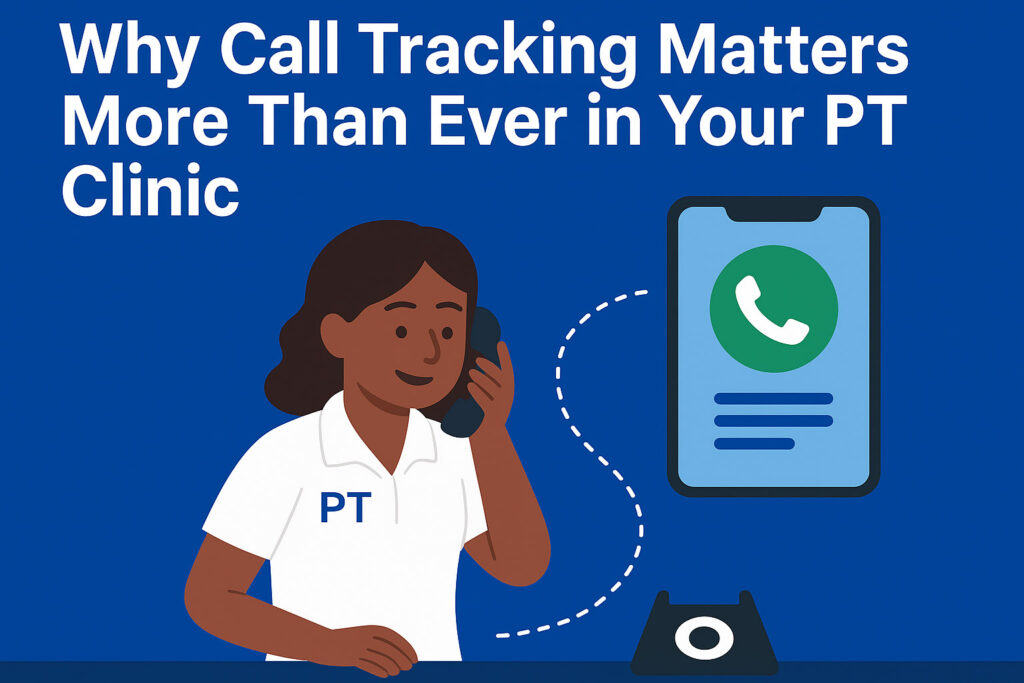Practice Management
Clayton W.
Why Call Tracking Matters More Than Ever in Your Clinic
And how to choose the right tool to actually make sense of the conversations happening every day. What happens when someone calls your clinic? Do they get helpful answers? Do they book a visit? Or do they hang up feeling confused or worse, forgotten?

Paul Singh, CEO of StrataPT, put it plainly in a recent LinkedIn post:
“Record every call at your PT or OT clinic… and start learning.”
We couldn’t agree more.
Call tracking isn’t just about recording. It’s about turning conversations into insights — and insights into patient growth.
Let’s break down the tools, the benefits, and why the right system can help you book more care plans, coach your team, and build a better patient experience.
🔍 Why Call Tracking Should Be a Non-Negotiable
When a patient picks up the phone, they’re at one of the most critical points in their decision-making journey.
As Jerry Durham said in our interview:
“Your front desk is your first salesperson. If you don’t know what they’re saying, you don’t know what your patient experience really is.”
Call tracking helps you:
- Know how many leads are turning into evals
- Identify which marketing efforts are working
- Coach staff based on real-world calls
- Spot missed opportunities before they become missed revenue
And most importantly, it gives you clarity something most clinics still lack.
🛠️ 5 Tools Clinics Use for Call Tracking (and What Makes Them Different)
Here are five platforms physical therapy clinics are using to track, analyze, and improve calls:
✅ 1. Jet AI (Our Recommendation)
- Built specifically for orthopedic and physical therapy clinics
- AI call summaries, keyword detection, front desk scorecards
- Tracks revenue from booked vs. missed calls
- Includes 30-day free trial
- Bias alert: It’s the tool we’ve seen give the best visibility for multi-location clinics
Best for:
Clinics that want clear front desk performance data, real-time coaching insights, and simple reporting
✅ 2. CallHero
- Created by Rick Lau, focused on receptionist tracking
- Missed call recovery tools and staff scorecards
- Tracks call answer rate and booked revenue
- Strong in the chiro and dental spaces
Best for:
Clinics that want a human-audited tool focused on front desk performance
✅ 3. CallRail
- Robust marketing attribution and tracking
- Connects calls to PPC and SEO efforts
- Offers keyword-level reporting
- Used by many marketing agencies
Best for:
Clinics working with agencies or running multiple ad campaigns across platforms
✅ 4. CallTrackingMetrics
- Very customizable platform with marketing integrations
- Advanced automation options
- Can route calls, record, tag, and analyze at scale
- Requires more technical setup
Best for:
Clinics or marketers that need flexibility and granular control
✅ 5. WhatConverts
- Focuses on call attribution and lead source tracking
- Offers form tracking, chat tracking, and call summaries
- Ideal for understanding lead value by channel
Best for:
Clinics investing heavily in lead generation who need ROI clarity
🧠 What to Look For in a Call Tracking Platform
Before choosing a tool, ask yourself:
- Do I want to coach my front desk team?
- Do I need to see which calls actually booked?
- Do I want to know how my ads are performing?
If the answer is yes to any of those, then call tracking is no longer optional. It is mission-critical.
And if you’re still unsure where to start, start simple. Start where most clinics do.
Calls Are Marketing. Treat Them Like It.
Most clinics obsess over ad copy, SEO, and patient reviews.
But if your phone rings and no one knows what happens next, you’re flying blind.
Call tracking helps you close the gap between marketing and revenue.
So whether you choose Jet AI, CallHero, or something else, don’t let another call go unchecked.
Want to try Jet AI free for 30 days?
👉 Start your free trial here
Let your calls work for you, not against you.




